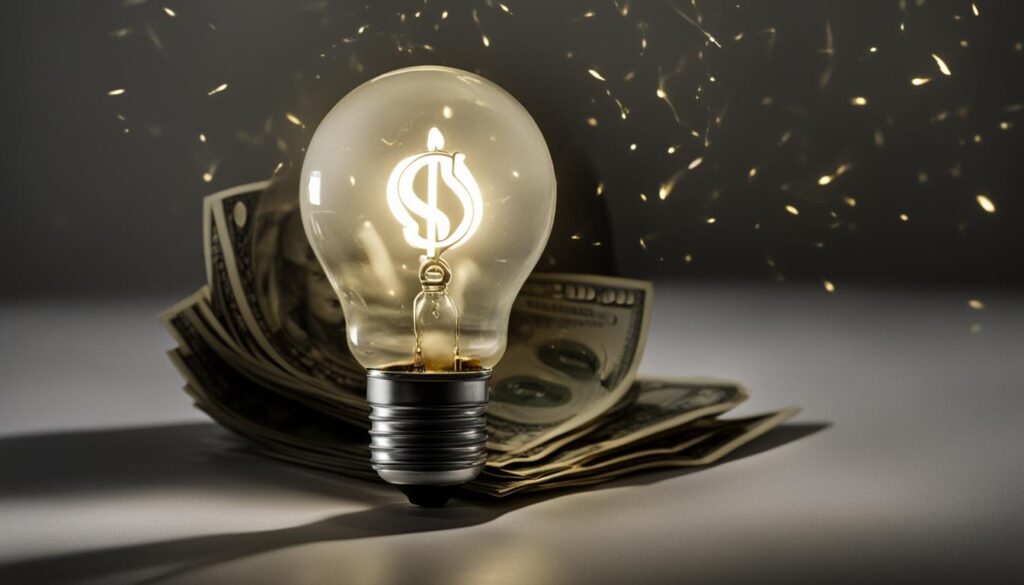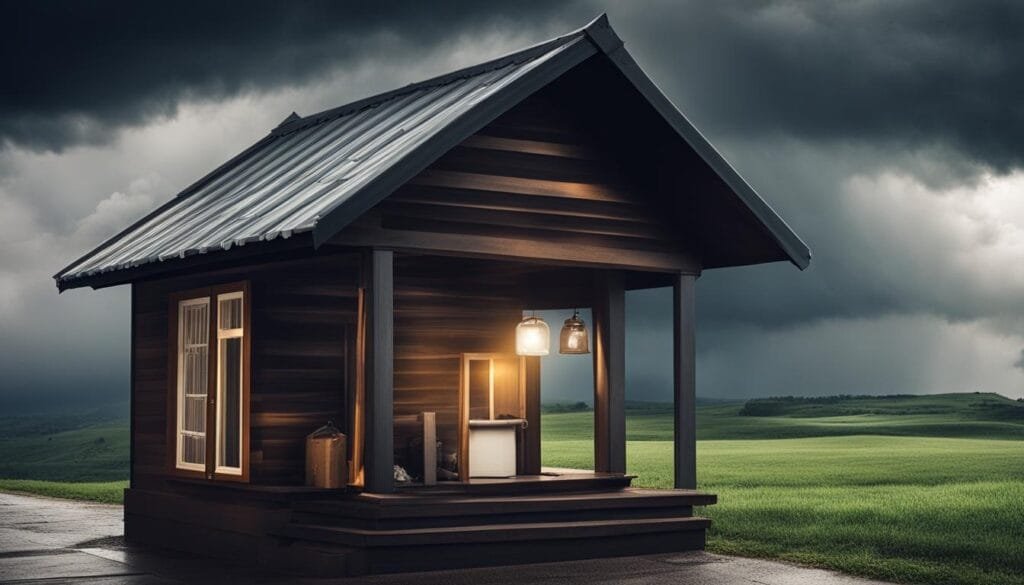Managing utility bills can be a challenging task for any household. From electricity to water, these expenses can quickly add up and put a strain on your budget. However, with effective budgeting, you can minimize costs and ensure that you have enough funds allocated for your utility needs. In this article, we will explore various strategies and tips to help you achieve a stress-free household by budgeting for utilities effectively.
Key Takeaways:
- Implement budget billing to manage fluctuating utility bills effectively.
- Understand the potential drawbacks of budget billing, such as owing money at the end of the year.
- Make conscious efforts to reduce energy and water usage for long-term savings.
- Consider shopping around and comparing utility providers to find better deals.
- By adopting these strategies, you can achieve effective money management and a stress-free household.
Understanding the Benefits and Pitfalls of Budget Billing
Budget billing is a popular practice offered by many utility companies that allows customers to pay a consistent amount for their electricity, gas, or water every month based on average usage. This approach can be beneficial for budgeting purposes, as it helps make expenses more predictable and allows for accurate allocation of funds. By converting variable utility costs into fixed expenses, budget billing can increase the chances of sticking to your budget and minimizing financial stress.
However, it’s essential to consider the potential pitfalls of budget billing. At the end of the year, most utilities will assess your actual usage and make adjustments accordingly. This means that if your average usage was underestimated, you may owe money for the difference. It’s important to thoroughly understand the terms and conditions of the budget billing program before signing up to avoid any surprises when the annual assessment takes place. Additionally, some utilities charge startup and maintenance fees for budget billing, so it’s crucial to check for any associated costs before enrolling in a program.
To summarize, budget billing offers several benefits such as predictable expenses and accurate utility costs, making it easier to stick to your budget. However, understanding the potential pitfalls, such as owing money at the end of the year and associated fees, is crucial for effective budgeting. By weighing the pros and cons and being well-informed, you can make an informed decision about whether budget billing is the right option for you.
Pros and Cons of Budget Billing
| Pros | Cons |
|---|---|
| Increased predictability of expenses | Possible owing of money at the end of the year |
| Accurate allocation of funds | Associated startup and maintenance fees |
| Helps sticking to your budget |
Tips for Reducing Utility Costs
Lowering utility costs is a goal for many households, and fortunately, there are several ways to achieve it. By implementing simple lifestyle changes and adopting energy-efficient practices, you can significantly reduce your energy consumption, save water, and cut down on heating and cooling expenses. Here are some practical tips to help you lower your utility bills:
1. Use Energy-Efficient Lighting
One of the easiest ways to save on electricity is by switching to energy-efficient lightbulbs. LED bulbs and Energy Star certified bulbs consume less energy than traditional incandescent bulbs, making them a cost-effective choice for lighting your home. By replacing your old bulbs with energy-efficient options, you can reduce your electricity usage and lower your lighting expenses.
2. Fix Leaks and Use Water-Saving Strategies
When it comes to water bills, fixing leaks and adopting water-saving strategies can make a big difference. Repair any leaks in faucets, pipes, or toilets promptly to prevent unnecessary water wastage. Additionally, consider installing low-flow faucets and toilets to reduce water consumption. You can also save water by running appliances like dishwashers and washing machines during off-peak hours when water rates may be lower.
3. Adjust Thermostat Settings and Improve Insulation
Heating and cooling expenses can add up, especially during extreme weather conditions. To save on these costs, adjust your thermostat settings to be more energy-efficient. Set your thermostat a few degrees lower in winter and a few degrees higher in summer to reduce the workload on your heating and cooling systems. Additionally, improving your home’s insulation can help retain heat in winter and keep your home cooler in summer, resulting in energy savings and lower utility bills.
By implementing these tips, you can achieve significant energy savings, lower your utility bills, and contribute to a more sustainable future. Remember, even small changes can add up to significant savings over time.

Shopping for Better Utility Deals
When it comes to managing your household expenses, finding the best utility deals can make a significant difference in your monthly budget. By taking the time to research and compare providers, you can potentially save on electricity, gas, heating, and cooling costs. Websites like InMyArea can be a valuable resource in helping you find and compare utility providers in your area.
One of the key factors to consider when shopping for utility deals is the rate offered by each provider. By comparing the rates of different providers, you can identify more affordable options that align with your budget. Keep in mind that some providers may offer reduced rates during off-peak hours, so adjusting your energy usage accordingly can lead to additional savings.
| Provider | Electricity Rate (per kWh) | Gas Rate (per therm) | Heating and Cooling Rate (per hour) |
|---|---|---|---|
| Provider A | $0.12 | $0.80 | $0.10 |
| Provider B | $0.10 | $0.75 | $0.12 |
| Provider C | $0.15 | $0.85 | $0.08 |
Additionally, being mindful of your thermostat settings and implementing energy-saving practices can help reduce your gas, heating, and cooling expenses. Properly insulating your home and using programmable thermostats can help optimize energy usage and lower your overall costs.
By taking the time to shop around and explore your options, you can find the best utility deals that suit your needs and budget. Making informed decisions about your utility providers and implementing energy-efficient practices can lead to significant savings in the long run.
Conclusion
Budgeting for utilities is an essential component of effective money management. By employing budget billing options, actively reducing energy and water usage, and exploring better utility deals, households can successfully reduce expenses and allocate funds effectively. Implementing small changes, such as turning off lights when not in use, can accumulate significant energy savings over time.
By prioritizing energy-efficient practices and making informed choices, households can achieve a stress-free and cost-effective approach to managing their utility bills. Lowering utility costs not only benefits the household budget but also contributes to a more sustainable environment. Through conscious effort and effective money management, households can strike a balance between utility expenses and savings.
Remember, budgeting for utilities is an ongoing process that requires consistent attention and evaluation. Regularly reviewing utility usage and comparing providers enables households to make informed decisions and potentially discover more favorable deals. By practicing effective money management and being mindful of energy consumption, households can create a healthier financial future while reducing their impact on the environment. Additionally, seasonal budgeting for utility expenses can help households prepare for fluctuations in energy costs throughout the year. For instance, families may notice increased heating bills in winter or higher cooling costs during the summer months; planning for these variations allows for better cash flow management. By anticipating these changes and adjusting budgets accordingly, individuals can ensure they remain financially stable while mitigating any end-of-season surprises.
FAQ
What is budget billing?
Budget billing is a practice offered by many utilities where customers are charged the same amount for electricity, gas, or water every month based on average usage. This helps in planning a budget and making expenses more predictable.
Are there any drawbacks to budget billing?
Yes, there are potential drawbacks to budget billing. At the end of the year, actual usage is assessed, and adjustments may be made. This means that customers may owe money if their usage exceeds the budgeted amount. Additionally, some utilities charge startup and maintenance fees for budget billing programs.
How can I reduce my utility costs?
You can reduce your utility costs by making simple lifestyle changes and practicing energy-efficient habits. This includes using energy-efficient lightbulbs, like LED or Energy Star certified bulbs, installing solar panels or energy-efficient appliances, fixing leaks and using low-flow faucets and toilets, running appliances at off-peak hours, adjusting thermostats, and improving home insulation.
How can I find the best utility deals?
You can find the best utility deals by researching and comparing providers in your area. Websites like InMyArea can help you compare providers and their rates. You can also take advantage of reduced rates by running appliances during off-peak hours when many providers offer discounted rates.
How can budgeting for utilities help with effective money management?
Budgeting for utilities allows you to minimize costs and allocate funds effectively. By understanding budget billing options, reducing energy and water usage, and exploring better utility deals, you can lower your expenses and manage your money more efficiently.
How Can I Budget for Groceries While Also Managing my Utility Expenses?
When it comes to managing your utility expenses while budgeting for groceries, there are a few strategies you can employ. First, assess your monthly income and determine a realistic amount you can allocate for both groceries and utilities. This way, you can prioritize your spending and ensure there’s enough for each category. Additionally, consider meal planning and buying in bulk to save on grocery costs, while practicing energy-saving habits like turning off lights and using appliances efficiently to reduce utility expenses. By finding a balance and sticking to your budget, you can effectively manage both aspects of your household expenses.
Source Links
- https://www.incharge.org/financial-literacy/budgeting-saving/how-to-save-money-on-electric-gas-water-bill/
- https://money.usnews.com/money/personal-finance/articles/should-you-use-budget-billing-for-your-utilities
- https://www.cnet.com/home/kitchen-and-household/exactly-how-much-can-you-save-by-turning-off-the-lights-at-home/


Pingback: Avoid These 7 Budgeting Mistakes That Could Cost You – Straight Fire Money